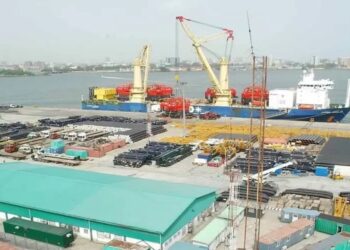Plastic recycling presents a multitude of opportunities to stimulate job creation and tackle pressing environmental issues.
The topic of recyclable plastics has been a prominent subject of discussion in Nigeria and many other countries for years. However, the practicality of recycling plastic materials has often been questioned, raising concerns about its economic and environmental impact on the unrecovered plastics in our environment.
According to a 2022 report published by the Lagos State Employment Trust Fund (LSETF), the German Agency for International Cooperation (GIZ), and FATE Foundation, Nigeria generates 32 million tons of municipal solid waste annually, with plastic constituting approximately 13 percent of that volume. An independent survey supports this data, revealing that over 220 million people in Nigeria produce more than 2.5 million metric tons of plastic waste each year. Interestingly, the global recycled plastics market size reached $47.60 billion in 2022 and is projected to experience a compound annual growth rate (CAGR) of 4.9 per cent from 2023 to 2030. Notably, the potential market for plastic recycling in Nigeria is estimated at $40 billion.
These statistics indicate a significant opportunity for plastic recycling to contribute to the development of a circular economy and add to a greener economic prosperity in Nigeria. The waste management sector, with its vast untapped potential, remains a marginalised activity within the Nigerian economy. In a recent publication, the Lagos State Waste Management Authority (LAWMA) reported that the recycling economy in Lagos State alone generated approximately N18 billion in value as of 2021.
While the recycling sector proves profitable for both the economy and society, its potential appears undervalued, particularly across the manufacturing value chain. This undervaluation is exacerbated by inadequate government policies and increased advocacy by activists calling for a halt in the use and production of recyclable plastic materials.
The pertinent question to ask is: Why are we failing to tap into the potential goldmine within our grasp—the opportunity to empower thousands of Nigerians economically and generate substantial government revenue through plastic recycling? Western economies have demonstrated that the plastic recycling industry, under the right regulations and government policies, can import millions of tons of plastic annually, including from Nigeria, to support their recycling industry, create thousands of jobs, and generate revenue for the government.
While it is crucial to address the environmental impact of plastic, we should also consider how other economies are successfully turning the tide and making significant economic strides in the process. Discontinuing the use of recyclable plastic would have drastic economic, environmental, and political consequences for the country.
Plastic recycling has been widely recognised as a means to reduce the proliferation of non-degradable waste, curbing pollution and minimizing its impact on people’s lives. Additionally, by encouraging recycling activities, we can promote healthy living and advance the well-being of Nigerians, aligning with the targets of Goal 3 of the United Nations’ Sustainable Development Goals (SDGs).
Furthermore, policies that discourage recycling would compromise private sector efforts towards sustainable manufacturing, which aligns with SDG Goal 12—responsible consumption and production. Responsible recycling policies and practices can help reduce our ecological footprint. Halting active recycling would likely result in incineration becoming the primary waste treatment method in the country.
This, in turn, would lead to the continuous release of hazardous chemicals and materials, posing a significant threat to the environment we all cherish and seek to protect. Instead, we should focus on strengthening the plastic recycling value chain by institutionalizing policies that mandate recovery by producers, establishing annual targets through the Extended Producer Responsibility (EPR) framework, supporting local recycling initiatives through incentives and rebates, as seen in some European countries, and promoting the inclusion of recycled plastics content in plastic packaging in Nigeria.
It is important to reiterate that discouraging plastic recycling will undoubtedly lead to climate-related hazards and natural disasters. It would impede efforts by key stakeholders in Nigeria to take urgent action in combating climate change and its impacts. Additionally, we must consider the potential loss of human resources and the resulting unemployment if plastic recycling is not encouraged. Such a decision would also jeopardize social enterprises and businesses that have made significant investments in recycling. The individuals directly affected would be those in the industry’s value chain. This would hinder the creation of decent jobs, entrepreneurship, creativity, and economic diversification.
Co-founder of CrichWeather Recycling,Isaac Jacob Omosimua, explained that plastic waste pickers, commonly referred to as scavengers, earn revenue in Lagos State by selling their collected waste to waste collectors at rates ranging from N70 to N100 per kilogram (N70,000 to N100,000 per ton). Waste collectors then sell the collected waste to processors for approximately N170 per kilogram (N170,000 per ton). The processors subsequently transform the recycled materials into pellets or shapes, selling them to the final users of the shredded plastics at a price of N280 or higher per kilogram. Over 3,000 waste pickers have been registered in Lagos State by the Association of Waste Pickers of Lagos, with the support of the Food and Beverage Recycling Alliance (FBRA), out of an estimated 5,000 pickers.
Based on the stimulated plastic collection supply chain, the industry has attracted additional investments from individual member companies and foreign direct investment totalling approximately 40 billion naira in the past five (5) years. These investments have gone towards developing collection infrastructures, adopting advanced technologies, and establishing bottle-to-fiber and bottle-to-bottle high technology recycling facilities. Polysmart Recycling, for instance, is a wholly indigenous multimillion-dollar plastic recycling facility located along the Lagos-Ibadan expressway. Since commencing production in 2021, Polysmart Recycling has been engaged in the complete recycling of used plastic bottles, from collection to the production of six million food-grade PET bottles daily, effectively removing approximately 9 million bottles from the environment each day. Their collection network economically empowers over 20,000 women and youth, promoting gender and social inclusivity. As stated by the managing director of LAWMA, Mr. Ibrahim Odumboni, “If Polysmart collects 7 million bottles on a daily basis, gradually, plastic pollution will disappear, resulting in a plastic-free environment.”
These investments in recycling facilities not only close the circular plastic loop but also support Nigeria’s drive for net export through the production and sale of plastic flakes for fiber and EU-standard food-grade recycled plastics resin to overseas markets. Additionally, these investments create and sustain hundreds of micro, small, and medium-sized enterprises (MSMEs) and generate thousands of jobs in the value chain. Existing recycling companies are projected to export over 200,000 metric tons of processed PET products annually starting from 2023, corresponding to an invoice value of approximately 260 million US dollars FOB.
Therefore, the potential loss of jobs could lead to waste pickers and collectors, who are at the bottom of the economic pyramid, resorting to criminal activities and becoming a nuisance to society. Moreover, discouraging recycling can result in a loss of revenue for the government, particularly when there is an emphasis on diversifying the economy. The viability of the plastic recycling business is undeniable, and the loss of this additional stream of income for the government could have significant long-term consequences. Diminishing the growing investment potential of the recycling industry would create an unfavourable ripple effect for Nigerians. By implementing proper regulation and providing support for industry stakeholders, the government can turn plastic recycling into Nigeria’s next lucrative venture.





